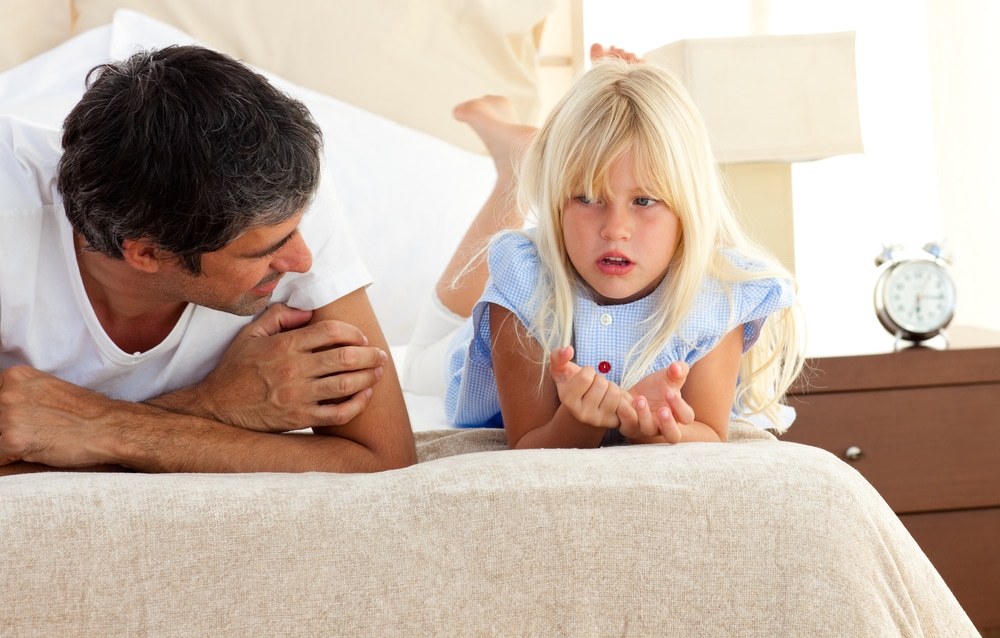
01 Oct How to Talk to Your Kids About Divorce
Divorce has a profound impact on children. It changes their perception of relationships, where they physically live, and with whom they spend most of their time. These challenges, combined with the innate difficulties of growing older, can inhibit a child’s development if not dealt with appropriately. During a separation, it’s incredibly important to talk to your kids about what’s going on and how it will impact them.
1. Be honest
Most parents discount how much information their children truly pick up on. The truth is, however, that kids are sponges. They’re always listening, even when we suspect not. They’re also surprisingly intuitive and can very often sense out a lie. When it comes to a separation or divorce, don’t lie to your kids. Don’t tell them that mommy/daddy is on vacation or mommy/daddy is working a lot. Eventually, the truth will come out. The kids will figure it out, or a situation will arise that will require the truth to be told. Tell them the truth that mommy and dad love them very much, but will no longer be together. Honesty is the best policy, especially concerning kids during a divorce.
2. Reassure their safety
When children first learn of a divorce, they often feel fear. They begin to wonder, if their parents are no longer together, what will happen to them? Where will they live? Who will they stay with? Reasonably so, children are scared about how their life will be impacted by the ending of their parent’s relationship. One of the best ways to begin a discussion about divorce with your children is to reassure their safety. Assure them that no matter what happens to the marriage, the children will always be loved and will always be taken care of. Safety is the foundation for kids; they need to know they will have somewhere to live, they will be taken care of, and they will be loved.
3. Don’t play against the other parent
Sadly, many parents are so immature that they’re unable to keep their children out of their messy marital relationship; playing the child against the other parent or using other tactics to cause the other parent pain. The key element they fail to recognize in these instances is the profound impact these tactics have on their children.
Children don’t understand these dynamics. They know that they love both their mom and dad and now their mother and father are challenging that fact. This teaches them exactly how not to behave in a relationship. If you have hope that your child may someday be able to enter into a functional relationship, model what that relationship looks like, even if you’re no longer married to your ex-spouse. Do not ever use your child as a tool to get back at your ex-spouse.
4. Communicate openly with the other spouse
One of the best ways to model healthy relationship dynamics for your children is to continue having an open, communicative relationship with your ex-spouse. When a marriage ends, it’s often difficult to navigate how to re-establish lines of communication. While this can be awkward, it’s so important to communicate with your ex-spouse when kids are involved. Discussion about the kids should never go through the kids. This adds a burden and often a feeling of discomfort to the kids.
Open lines of communication between both parents are in the children’s best interests. Parents who communicate are on the same page and are better able to make decisions regarding their children. Further, modeling this behavior reassures the children that, even though their parents are no longer together, they still care about, love and support them together.
5. Consider “Family” Outings
Family outings are a great way to open up the conversation about divorce. If a separation/divorce is civil, an outing with both parents provides the children the opportunity to express their fear and insecurities about the change that are taking place in the family. Family outings are a good idea even after the divorce. The provide the children the ability to see that both their parents still care about them, even though they are no longer married. Regular “family” dinners, trips to the zoo, sports events, etc. are all opportunities to use as family time.
Separation and divorce are scary for kids. They’re uncharted waters and threaten a child’s safety and stability. Talking to your children about divorce is incredibly important because it reassures them that they’re not alone, they’re still loved and will always be taken care of regardless of their parent’s relationship status. Healthy, open lines of communication between the children, as well as both parents, can help to promote the children’s adjustment during a difficult period for them. Ultimately, communication between all parties involved promotes a healthier environment for the children.

